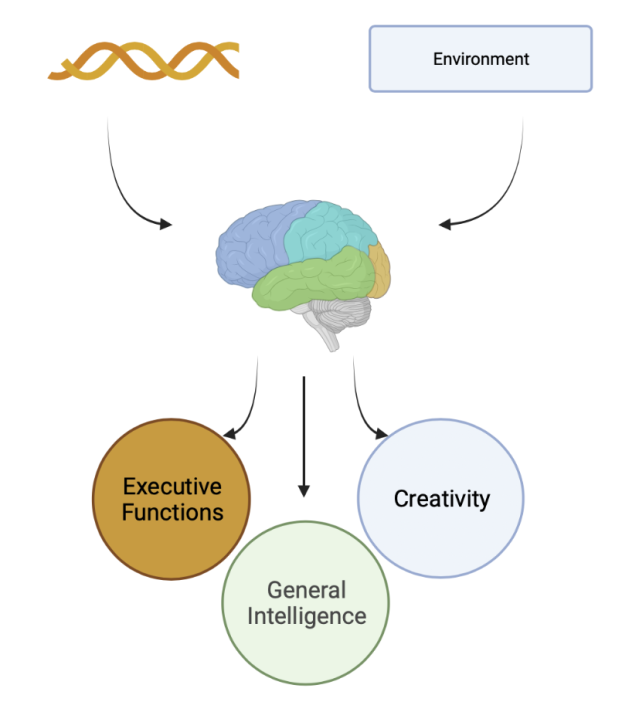Intelligence
Unveiling the Secrets of Intelligence and Giftedness
Similarities and differences.
Posted January 7, 2024 Reviewed by Jessica Schrader
Key points
- Intelligence refers to reasoning, learning from experience, problem-solving, and adapting to new situations.
- Intelligence plays a pivotal role in shaping decision-making and life outcomes.
- Intelligence results from a combination of genetic and environmental factors.
- Giftedness is not just high intelligence; it combines advanced cognitive abilities with heightened intensity.
Human intelligence has long been an object of curiosity and extensive study. The concept of intelligence encompasses abilities like reasoning, learning from experience, problem-solving, and adapting to new situations. Interestingly, intelligence remains relatively stable throughout one's life.
The burgeoning interest in the field of decision-making centers around examining correlations between intelligence and behavior and uncovering causal connections. Based on an extensive body of literature, there is a prevailing belief that intelligence plays a pivotal role in shaping diverse life outcomes, encompassing academic and occupational performance, socio-economic achievements, and even overall health and well-being.
What Is Intelligence and How Is It Measured?
The study of intelligence has unveiled its intricate nature, composed of a multitude of interconnected abilities. This complex system encompasses fundamental executive functions that underpin reasoning, working memory, inhibitory control, and cognitive flexibility.
Working memory denotes the capacity to temporarily retain information while simultaneously performing other cognitive tasks. For instance, when summing up a long series of numbers, one may retain the cumulative total of those already accounted for while incorporating new figures.
Cognitive flexibility, on the other hand, refers to the skill of smoothly transitioning between different tasks, facilitating efficient multitasking. Inhibitory control, a crucial facet of intelligence, involves the ability to suppress dominant yet irrelevant responses, such as impulsive urges. These functions frequently collaborate, as problem-solving often necessitates inhibiting an intuitive yet suboptimal response before engaging working memory to compute the optimal solution.
Moreover, intelligence tests encompass a broader spectrum of abilities, including awareness, processing speed, and discrimination between verbal tasks (such as reading and responding in words) and visuospatial tasks (such as mental rotation or memorizing spatial configurations). Performance across these diverse domains contributes to an overall assessment of intelligence.
Factors of Intelligence
For a long time, scientists have noticed that the size of the brain is connected to how smart someone is. But researchers have also discovered that other structural characteristics matter for intelligence, too. These include how tightly the brain cells are packed together, how many brain cells there are, how thick the outer part of the brain is, how far apart the cells are inside the brain, and how quickly information travels in the brain.

Furthermore, the proper functioning of the frontal lobes, particularly the prefrontal cortex, has been recognized as vital for human intelligence, and "efficient information flow" among certain regions or subgroups thereof underlies individual differences in intelligence. Moreover, the white matter tracts connecting these regions play a significant role, as they provide the infrastructure for rapid information processing within a widespread network that supports intelligence. In summary, while some regions serve as pivotal processing areas for intelligence, the integrity and robust connections across this network of regions also contribute significantly.
Intelligence exhibits a strong hereditary component, yet it is not solely a result of genetic factors; environmental influences play a significant role as well. Nutrition, especially during the developmental stages, holds paramount importance. Additionally, exposure to pollutants during specific periods of pregnancy can have enduring adverse effects on a child's development, manifesting in long-lasting repercussions throughout their formative years.
What is Giftedness?
Giftedness, often discussed in tandem with intelligence, refers to individuals, particularly children, who exhibit extraordinarily high levels of skills like intelligence, creativity, and excitability. This phenomenon is not just a higher degree of intelligence but a distinct attribute characterized by asynchronous development, combining advanced cognitive abilities and heightened intensity. Giftedness is a form of deviance.
Gifted people often have a wider knowledge base and show more advanced problem-solving and thinking-about-thinking (metacognitive) skills. Many gifted children who have been studied have unique brain organization. Their areas of expertise often indicate that specific parts of their brains have developed a bit differently.
For instance, gifted individuals in math and music tend to have better development in the right side of their brains. Interestingly, people who excel in math, visual arts, and music are more likely to be left-handed, even though most people are right-handed. These differences are also linked to a higher chance of having language-related learning issues like dyslexia.
Gifted children tend to perceive and interact with the world in unique ways, which can often lead to social and emotional challenges. Emotional intelligence, the skill that allows individuals to recognize, understand, manage, and express their own emotions and the emotions of others, differs across gifted and non-gifted individuals.
Gifted individuals tend to have a higher ability to reason about emotions than non-gifted people. At the same time, they have a lower ability to assess their own emotional abilities and behavioral dispositions. Furthermore, gifted children tend to be more sensitive to their environment, and sensory stimulation can occasionally lead to heightened excitement or push them to isolate.
A significant number of gifted children exhibit perfectionistic traits. They often establish expectations that align with their mental development but may not align with their physical growth or the capabilities of those around them. When they struggle to meet these expectations and tie their self-worth solely to their achievements, perfectionism can become harmful.
The Future
Much research is still needed. Understanding the distinctions between intelligence and giftedness, as well as recognizing the blend of genetic inclinations and environmental factors they encompass, is of utmost importance for designing educational interventions.
Specifically, the asynchronous development seen in gifted children hinders their ability to thrive in conventional educational settings. Simultaneously, isolating them from their peers can be detrimental to the social development necessary for later-life interactions.
Acknowledging the significant diversity in the cognitive and emotional development of children with different traits should drive us toward the implementation of better-tailored educational environments and strategies.




